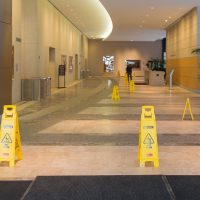The responsibility for repairing broken sidewalks can vary depending on the local laws and regulations of each city or municipality. In Georgia, cities have a duty to inspect, repair, and safely maintain sidewalks within its boundaries. If the sidewalk falls within the boundaries of a private individual or another city, then that duty belongs to that entity.
In Georgia, that duty falls under O.C.G.A. § 51-3-1, under the law property owners have a duty to maintain their sidewalks and ensure they are reasonably safe for pedestrians. If a property owner fails to address a known hazard, such as a broken sidewalk, and someone is injured as a result, the property owner may be held liable for the injuries and damages.
To have a strong case, you would typically need to demonstrate the following elements:
- Duty of care: Show that the property owner had a duty of care to maintain the sidewalk.
- Breach of duty: Prove that the property owner failed to fulfill their duty by not repairing or warning about the broken sidewalk.
- Causation: Establish a direct link between the broken sidewalk and your injuries.
- Damages: Provide evidence of the physical, emotional, or financial harm you suffered due to the fall.
Here are some common scenarios:
- City responsibility: In some places, cities are responsible for sidewalk maintenance, and they have a duty to keep sidewalks in a safe condition for pedestrians. If a sidewalk becomes damaged due to natural wear and tear or other factors, the city may be obligated to repair it.
- Property owner responsibility: In other locations, property owners may be responsible for the sidewalks adjacent to their property. This means that if the sidewalk in front of a property is damaged, the property owner may need to arrange for repairs.
- Shared responsibility: Some areas have shared responsibility, where both the city and property owners are responsible for sidewalk maintenance and repairs. The specific responsibilities and requirements may be defined by local ordinances.
If you encounter a broken sidewalk, it’s a good idea to check the local laws and regulations in your area to determine who is responsible for sidewalk maintenance. You can contact your city’s public works department or relevant local authorities to inquire about the repair process and report any hazardous conditions.
Cities and other property owners quite often are able to escape responsibility for allowing sidewalks to be come unsafe by raising common defenses:
- Governmental Immunity: It’s important to note that governmental entities, including cities governments, may have certain immunities or limitations on liability. This is called Sovereign Immunity. This can affect your ability to sue, and there might be specific procedures and timelines for making claims against government entities. Sovereign immunity is a legal principle that traditionally protected governments, including cities and municipalities, from certain lawsuits. However, many states have waived sovereign immunity to some extent, allowing individuals to sue governmental entities in specific situations, including cases involving injuries caused by broken sidewalks. In the context of a broken sidewalk, whether a city has sovereign immunity depends on the laws of the state where the city is located. Some states have limited or partially waived sovereign immunity for certain types of claims, such as personal injury claims arising from dangerous or defective public property, like broken sidewalks. In such cases, the city may be held liable for injuries caused by its failure to maintain safe sidewalks. However, even if a state has waived sovereign immunity for sidewalk-related claims, there may be specific procedures and limitations on the amount of damages that can be recovered. It’s important to note that each state has its own laws regarding sovereign immunity and the exceptions to it.
- Notice: If you are injured due to a broken sidewalk and plan to pursue a claim against a city or municipality in Georgia, it is essential to comply with these notice requirements to preserve your right to sue. According to the Georgia Code, you typically need to provide written notice to the city or municipality within six months of the incident that caused your injuries. The notice should include the following information:
- Your name and address.
- The date, time, and location of the incident (where the sidewalk is located).
- A description of the accident and the injuries you sustained.
- The names and contact information of any witnesses to the incident, if available.
- A statement of the nature and extent of the injuries or damages suffered.
It is crucial to ensure that the notice is properly delivered to the appropriate department or office within the city or municipality. Sending the notice via certified mail with a return receipt requested is recommended, as it provides proof of delivery. Failing to provide the required notice within the specified time frame could result in the loss of your right to sue the city or municipality for the injuries caused by the broken sidewalk.
- Comparative Fault: Georgia follows a modified comparative fault system. If your own actions contributed to the accident, the compensation you receive could be reduced based on the percentage of fault assigned to you. Many owners will argue that the hazard was Open & Obvious and thus, you should have been aware of the dangerous condition before it caused you to fall.
It’s essential contact Nichols Injury Law because we can evaluate your case and advise you on the best course of action. We will work to collect evidence as soon as possible after the incident, such as photographs of the broken sidewalk, witness statements, and any medical records related to your injuries.














